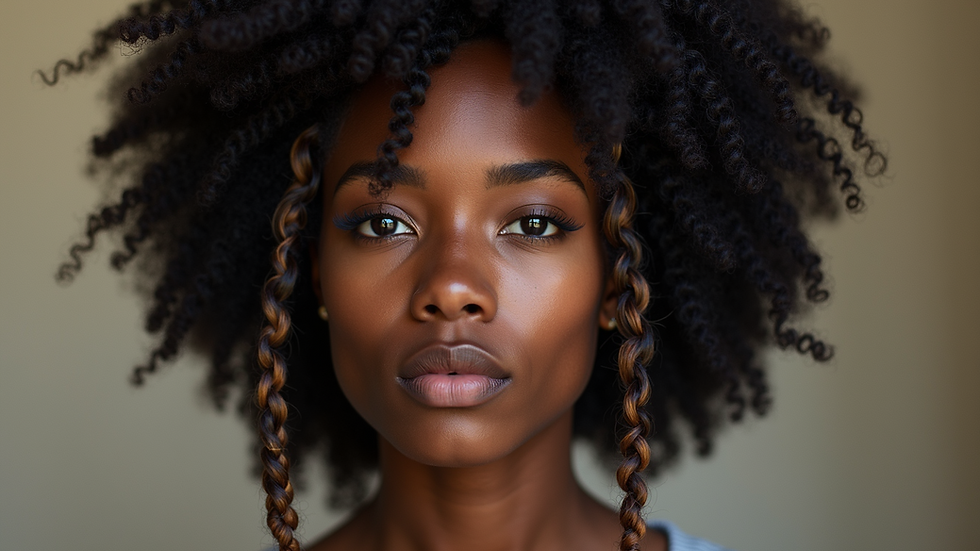Top Afro Hairstyling Tips for Beautiful Textured Hair
- Djimo Sandrine
- Oct 31
- 4 min read
Updated: 5 days ago
Afro-textured hair is unique, beautiful, and versatile. However, it requires special care and styling techniques to keep it healthy and looking its best. Many people with textured hair face challenges such as dryness, breakage, and shrinkage, which can make hairstyling feel overwhelming. This guide offers practical tips to help you embrace your natural texture and create stunning styles that highlight your hair’s beauty.

Understanding Afro-Textured Hair
Afro-textured hair is characterized by tight curls or coils that grow in a spiral pattern. This hair type tends to be drier than others because the natural oils from the scalp have a harder time traveling down the hair shaft. Understanding this helps you choose the right products and techniques to maintain moisture and prevent damage.
Key Characteristics
Curl pattern: Ranges from tight coils to loose curls.
Porosity: Often high, meaning hair absorbs moisture quickly but also loses it fast.
Fragility: Hair strands can be delicate and prone to breakage.
Shrinkage: Hair appears shorter than its actual length due to tight curls.
Knowing these traits allows you to tailor your hair care routine to meet your hair’s specific needs.
Essential Hair Care Practices
Healthy hair is the foundation of any great style. Here are some essential practices to keep your afro-textured hair strong and vibrant.
Moisturize Regularly
Moisture is crucial for afro hair. Use water-based leave-in conditioners or moisturizing sprays daily. Seal in moisture with natural oils like coconut, jojoba, or castor oil to prevent dryness.
Gentle Cleansing
Avoid harsh shampoos that strip natural oils. Opt for sulfate-free shampoos or co-wash (conditioner washing) to cleanse without drying out your hair.
Deep Conditioning
Incorporate deep conditioning treatments once a week. Look for products with ingredients like shea butter, avocado oil, and honey to nourish and strengthen your hair.
Protective Styling
Protective styles reduce manipulation and protect ends from damage. Examples include braids, twists, bantu knots, and updos. These styles help retain length and reduce breakage.
Styling Tips for Beautiful Afro Hair
Styling afro hair can be fun and creative. Here are some tips to help you achieve beautiful looks while maintaining hair health.
Detangle with Care
Always detangle hair when it’s damp and coated with conditioner. Use a wide-tooth comb or your fingers to gently remove knots from the ends toward the roots.
Define Your Curls
To enhance curl definition, apply curl creams or gels on wet hair. Use the “shingling” method by smoothing product through small sections of hair to encourage curl formation.
Embrace Twist-Outs and Braid-Outs
Twist-outs and braid-outs create defined waves and curls. Twist or braid damp hair, let it dry completely, then unravel for a textured look. These styles add volume and shape without heat.
Use Heat Sparingly
Heat styling tools can cause damage if overused. When you do use heat, always apply a heat protectant and keep the temperature low to medium.
Refresh Styles
To revive curls between washes, lightly mist hair with water or a leave-in spray and scrunch curls. Avoid heavy products that cause buildup.
Choosing the Right Tools and Products
The right tools and products make a big difference in styling afro hair.
Tools
Wide-tooth comb: For gentle detangling.
Denman brush: Helps define curls when used with styling products.
Satin bonnet or scarf: Protects hair at night and reduces friction.
Spray bottle: For misting hair during styling.
Products
Look for products designed for textured hair that provide moisture and hold without flaking or stiffness. Ingredients to seek include:
Shea butter
Aloe vera
Coconut oil
Glycerin
Castor oil
Avoid products with alcohol, sulfates, and silicones that can dry out or weigh down hair.
Nighttime Hair Care Routine
Protecting your hair while you sleep is key to maintaining styles and preventing damage.
Wrap hair in a satin or silk scarf.
Use a satin pillowcase if you prefer not to cover your hair.
Consider loose braids or twists to keep hair manageable.
Apply a light oil or moisturizer before bed to keep hair hydrated.
Common Styling Mistakes to Avoid
Avoid these pitfalls to keep your hair healthy and looking great.
Over-washing hair, which strips natural oils.
Using harsh brushes or combs on dry hair.
Applying heavy products that cause buildup.
Sleeping without protection, leading to breakage.
Excessive heat styling without protection.
Celebrating Your Natural Texture
Afro hair is versatile and can be styled in countless ways. Celebrate your natural texture by experimenting with different styles and products that work best for you. Remember, healthy hair is beautiful hair, so prioritize care and moisture.
Try styles like:
Afro puffs
High buns
Wash-and-go curls
Flat twists
Cornrows
Each style offers a unique way to express your personality and protect your hair.
Taking care of afro-textured hair requires patience and the right techniques. By moisturizing regularly, choosing suitable products, and protecting your hair, you can enjoy beautiful, healthy styles every day. Start with small changes in your routine and watch your hair thrive. Your natural texture is a gift—treat it with care and confidence.



Comments